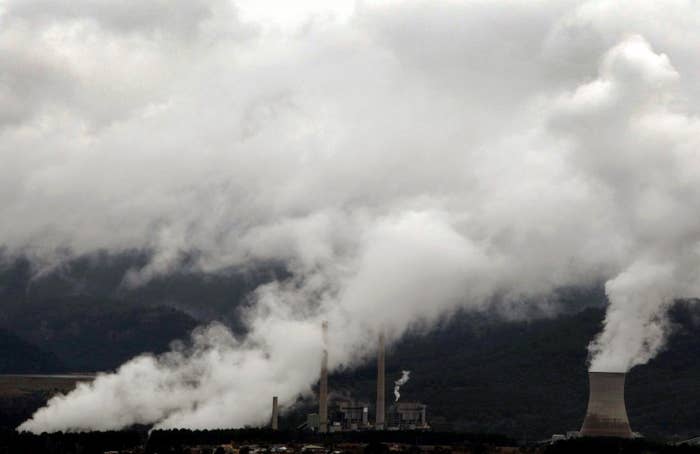A government committee has recommended the closure of all 24 coal fired power stations in Australia over the next 10 years.

The Retirement of coal fired power stations inquiry report, which is due to be tabled in the Senate on Monday afternoon, has recommended that coal fired power stations be retired and no new stations built, to make way for lower-emissions sources of power such as renewable energy.
"The question is not if coal fired power stations will close, but how quickly and orderly these closures will occur, and what supporting policies need to be in place to help manage the process," the report, obtained by BuzzFeed News, says.
"It is imperative that this reality is acknowledged by government, industry and the broader community, so that this transition can be adequately planned for and implemented at the lowest cost to consumers and taxpayers.
The report by the Environment and Communications References committee, which is chaired by the Greens and has a Labor majority, has ruffled feathers in the pro-coal Coalition. The Liberal members of the committee have penned a dissenting report that rejects the committee's findings.
Chair Larissa Waters wants all coal power stations closed by 2030, with an aim to reach 90% renewable energy in the next decade.

The report's recommendations include creating a comprehensive energy transition plan, reform of the National Electricity Market rules, a pollution reduction target, a plan for workers and communities, and an energy transition authority with powers.
The committee cited economic factors as the main reason for government intervention to phase out coal fired power stations, but added that In order for Australia to play its role in meeting the 2°C target required by the Paris Agreement, coal power plants need to close and renewable power needs to increase.

The report suggests creating a government payment-for-closure scheme where high emissions plant owners are paid to shut down, with taxpayers funding the cost of the closure.
A submission by AGL Energy recommended Australia follow Canada's lead and require power stations to be closed or retrofitted with carbon capture and storage once they are 50 years old.
Other options include the government directing particular power stations to shut down through regulation with the plant owner bearing the cost, similar to Germany's phase out scheme, which came into effect last month.
The German government's scheme to retire brown coal power stations involves electricity consumers funding payments of 230 million euros per year to the operators over seven years. Consumers will receive an increase to their power bills of 0.05 euro cents per kilowatt hours.
The committee pointed to the closure of the Alinta Energy Northern and Playford B coal power stations in South Australia in May 2016, and the announced closure of Victoria's Hazelwood plant, as examples of market generated exits without policy intervention.

Alternatively the government could introduce regulations that allow market forces to decide which stations would retire and when, with incentives for closure or disincentives for continued operation. These regulations would involve a carbon pricing mechanism, emission intensity scheme or government payments to the industry.
Mandating emissions performance standards for any new power generators would prevent any new high-emitting coal fired stations from being built.
Canada has implemented an emissions standard for new and existing coal fired generators, meaning no new coal fired power stations can be built without carbon capture and storage (CCS) technology.
The United States also has emissions standards that apply to new coal generators.
But modelling by the Jacobs Group found a policy that set a baseline constraint on emissions output would mean significant electricity price increases in the 2020s.
Unions warn closing power stations could leave workers vulnerable, but say a national plan would reduce uncertainty for workers in the industry and allow them to plan for a future without coal.
At a public hearing in Melbourne residents from the Latrobe Valley, where Hazelwood is based, told the committee: "We are finding that a lot of the distress in the workers and within the community is around uncertainty, and we believe that the only way around that uncertainty is the opposite of uncertainty: vision".
The committee wants the government to have a plan in place for the phasing out of coal fired power before the next COAG Energy Council meeting on 14th December.
